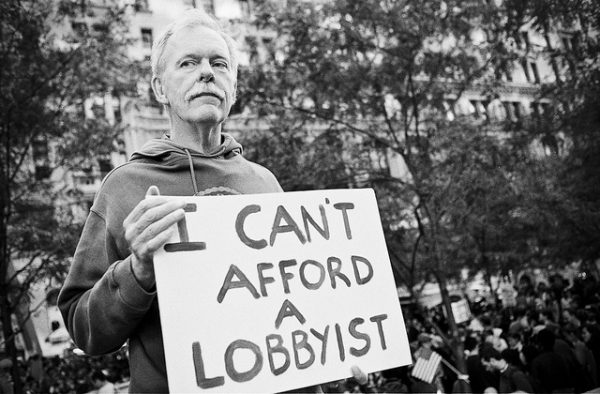
Today we are featuring a guest post by students at Oberlin College, who submitted a #TROT post as part of an active learning exercise for their political sociology class, taught by Professor Christi Smith. If you or your students would like to submit a post, please email tsp@thesocietypages.org.
Lobbying is defined by the United States Senate as “the practice of trying to persuade legislators to propose, pass, or defeat legislation or to change existing laws,” and lobbyists get paid to advocate on behalf of the private sector, corporations, government officials, and other interest groups. This political activity takes place at all levels of government. While lobbying as a way to engage with the government is interpreted as free speech, and is thus protected by the Constitution, the ethics of lobbying are much debated due to the unequal socioeconomic power and influence certain individuals and groups can have. Recent sociological research helps provide some perspective on the extent of lobbying in U.S. policymaking.
Corporate lobbying is one of the chief means by which businesses exercise political power in the United States. Corporate lobbying is not easily reducible to firms’ size and market interests, but rather includes their internal capacity for evaluating policy issues, participation in business policy networks, legacies of previous engagement, and economic circumstances. Firms that lobby have annual sales that are nearly four times higher on average than those who do not. More heavily regulated industries that are dependent on government contacts tend to lobby more often. And corporate influence is especially effective in influencing tax policy, financial deregulation, and anti-union activities by advocating for more political restrictions on unionization.
- Edward T. Walker and Christopher M. Rea. 2014. “The Political Mobilization of Firms and Industries.” Annual Review of Sociology 40: 281-204.
- Val Burris. 2001. “The Two Faces of Capital: Corporations and Individual Capitalists as Political Actors.” Annual Review of Sociology 66: 361–81.
- Dan Clawson and Mary Ann Clawson. 1999. “What Has Happened to the U.S. Labor Movement? Union Decline and Renewal.” Annual Review of Sociology 25: 95–119.
Lobbying can raise awareness and create urgency about certain issues. Professional lobbyists can have a greater impact than mass movements by participating at the early stages of the policy process and shaping the content of legislative content. But does it work? It is difficult to measure the actual direct impact of lobbying, as much of this activity takes place through private conversations and interpersonal encounters. In contrast, most nonprofits use indirect lobbying rather than the direct lobbying used by business and unions. For congressional voting patterns, interest groups’ lobbying influence is actually quite modest. It is actually less effective than protest is in advocating for certain policies regarding issues like civil rights and environmental sustainability, and it is less productive than whistleblowing in monitoring policy implementation. In short, the role of lobbying efforts in shifting the long-term priorities and resources of political institutions is still largely unknown.
- Kenneth T. Andrews and Bob Edwards. 2004. “Advocacy Organizations in the U.S. Political Process.” Annual Review of Sociology 30: 479-506.

Comments